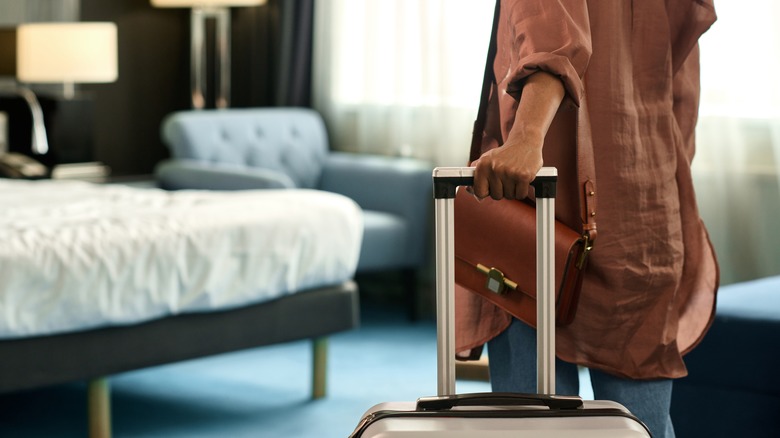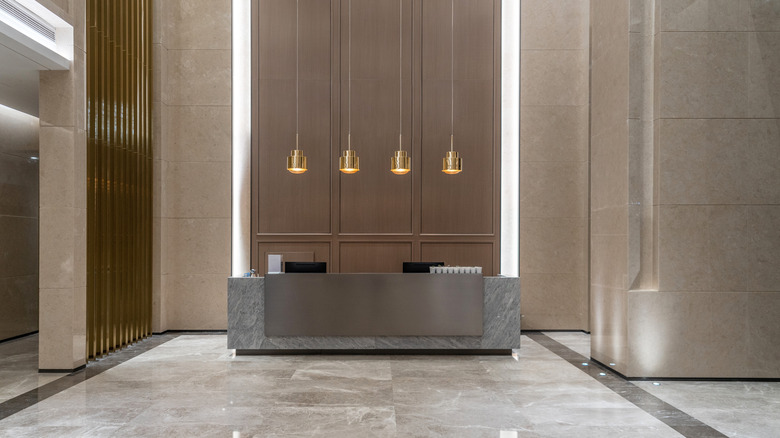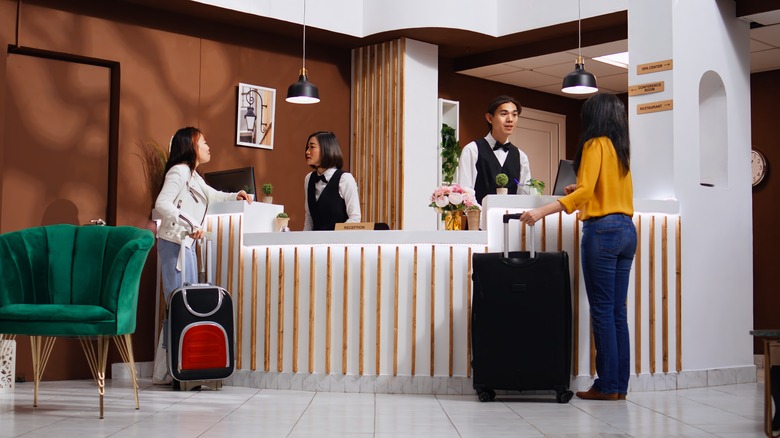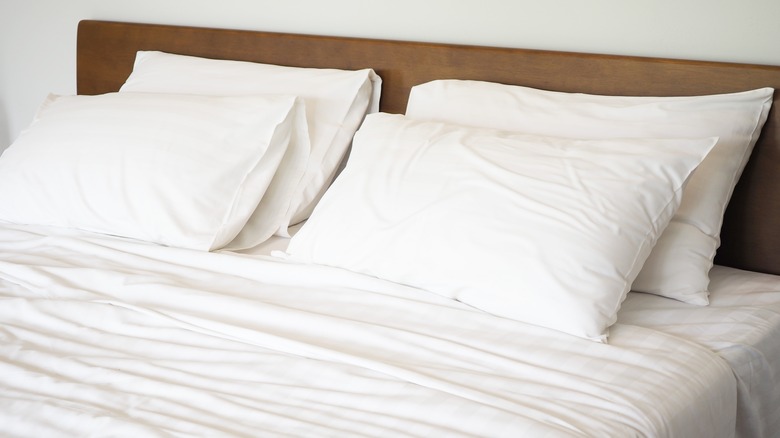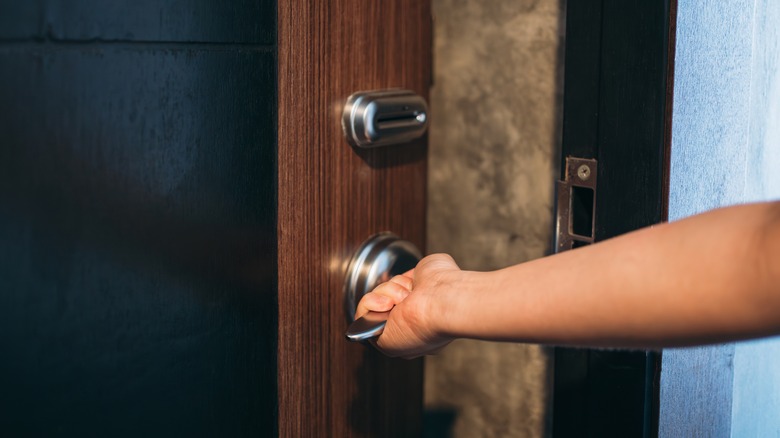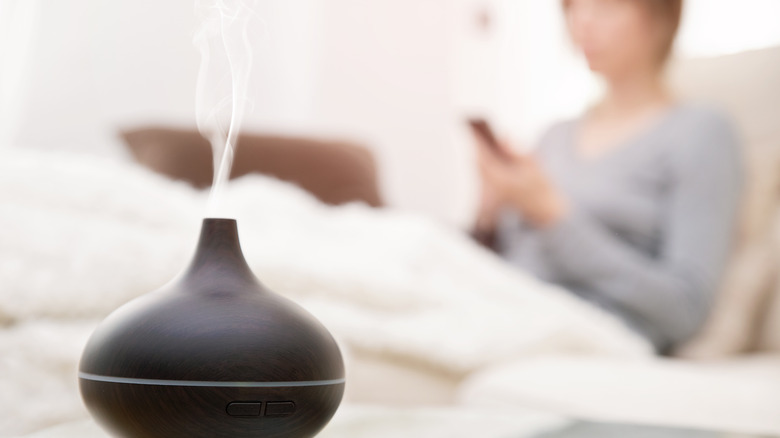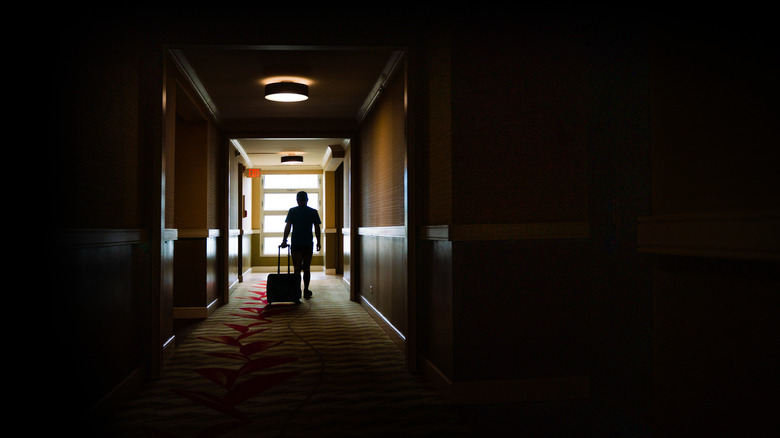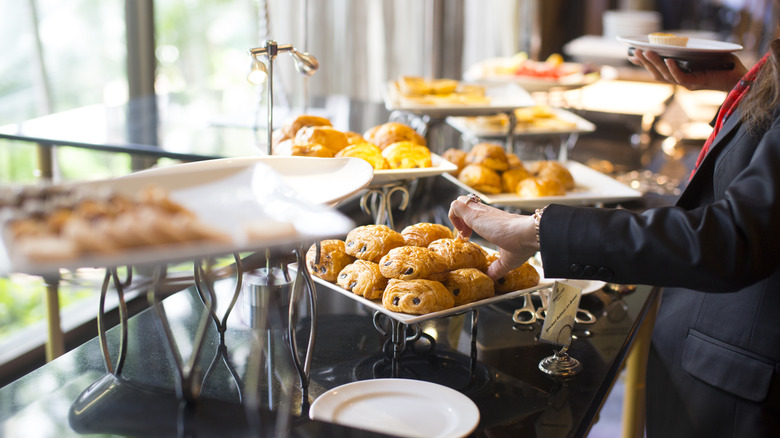Red Flags Common With Bad Hotels You Should Be On The Lookout For
The hotel industry caters to millions of customers. A feat it achieves by relying on certain foundational standards of service that cover a whole range of particulars. From how housekeeping folds bedding to the kind of lighting in its interiors to the aroma that hangs in the air, no detail is too small to offer hotel guests their money's worth.
Since manual effort is involved, there are bound to be lapses in service, and errant hotels can be given the benefit of the doubt. Perhaps there were no towels in your room when you arrived, or the breakfast buffet ran out of muffins when you wanted seconds. These situations are understandable, and we have all made allowances for similar circumstances, in one way or another, during a hotel stay.
However, there are other times when hotels don't cover all their bases to ensure guest satisfaction. It would be wise to steer clear of these establishments. After thoroughly researching reliable sources and turning into voices from the travel community, we compiled a list of hotel red flags you should watch out for the next time you're looking for accommodation.
Generic or shady stock photos of the hotel
Distinguishing between real and stock images is a skill that will serve you well while booking a hotel online. The internet is vast and full of resources that many hotels use today to create an impressive gallery of photos that don't honestly represent their establishments. You could be walking into a completely different setup that is nothing like the photos that invited you to make the hotel booking. Even worse, the hotel might not exist and could be a front for scammers. Fortunately, there are ways around this maneuver to get a realistic perspective of the hotel.
Watch out for generic photos of rooms, random closeups of décor, and other vague photography that doesn't tell you much about the hotel or the facilities it offers. Another tip to spot fake hotel photos is to look for signs of personalization, such as brand logos or signature designs the establishment is known for. Taking the time to browse photos and reviews shared by people who have stayed at a hotel will always give you a more authentic version beyond marketing gimmicks.
Worse still, no social media presence
Seriously, which business doesn't have a social media presence today? Social media serves as a key marketing tool for hotels in the digital age, where more than half of the world's population is online. And you can best believe that the travel and hospitality industries are trying to use this phenomenon optimally. So if the hotel you want to stay at is not traceable on any social media platform — be it Instagram or Facebook — you might want to reconsider it.
Community voices are strong on networking websites and can give real-time insights about a hotel. By scrolling through the comments on an accommodation's social media or closely examining its user-tagged photos, you can find out if what a hotel has been saying about itself actually checks out. What's more, the willingness of a hotel to build an online community and readily engage with travelers offers it great legitimacy. Without these features, it could be hard for travelers to verify crucial information promptly, and such inconvenience rarely bodes well for a place.
Lack of positive or recent reviews
A great way to determine if a hotel is worth booking is to find out what other travelers are saying about it. Comb through reviews on every platform where your potential accommodation has a presence, from Google reviews to Tripadvisor listings. If there are no recent reviews available, the hotel could be bad news. Outdated reviews, positive or negative, will rarely give you the full picture of current affairs at the hotel and its state.
Hotels with consistently poor reviews are also best avoided — "consistently" being the keyword. There will always be something to complain about, even at over-the-top luxury hotels with world-class service. So, it's best to consider a hotel's negative reviews with a pinch of salt. If you see one odd review criticizing a hotel for its supposedly subpar hospitality, for instance, then you may want to use your discretion. On the other hand, if too many travelers circle the same faults over and over again, maybe look for a different hotel.
Ambiguous cancellation and refund policy
People make changes to their hotel bookings all the time. You could have found a better establishment to stay at or be canceling your travel plans altogether. The reasons are plenty, and hotels that take customer service seriously incorporate this piece of information in their refund policies. Any hotel that makes rescheduling or cancellation a complicated affair is a major red flag in disguise, and you are better off making a reservation elsewhere.
Beware of inflexible or non-existent refund policies, especially when a hotel asks for the complete payment upfront when you book online. It is far more common for hotels to either request a small advance deposit or for your card details, which will not be used to charge you anything before a given due date. If a hotel's payment policies look suspicious in any way, then it's best not to take a chance.
Obscure location
The appeal of a secluded hotel is justified when it boasts of a niche location and has verifiably positive reviews to speak of. In other situations, it could be a serious gamble. You don't want to end up booking a stay in an unpopular neighborhood or a hotel that's way out into nowhere and keeps you far from all that travel action. There's a reason hotels across the world are clustered in and around city centers. The heart of a city is a coveted location for any hospitality business since it's usually where the bulk of tourist and commercial activities converge.
Travelers have attested to the importance of doing a virtual recon of the locality your potential hotel is in. "I always do my research with hotels and I actively avoid [those rated] "4.5/5 stars" but [is located] in the middle of a shady street or a dimly-lit alley," a Redditor shared in r/AskReddit. They went on to recall an experience where they came across a great-seeming hotel in Rome, only to find out on Google Maps that it was in a disreputable area. Besides putting your safety at risk, an obscurely located hotel will also likely inconvenience you with a lack of transportation options and longer travel times.
Unbelievably cheap room rates
Everyone loves a discount. But don't be too trusting of hotel prices that are too good to be true. If the hotel you are considering offers cut-rate rooms that are several price points lower than what other hotels in the area are showing, take it as an indication that something is probably off. It could be a case of drip pricing, wherein the hotel will charge you later for hidden fees that are not immediately made visible while booking.
While this might seem unethical, it has been known to occur in the hospitality industry. A Tripadvisor user warned about such an experience, claiming that a Hyatt hotel in India charged them 50% more than the booking price, citing previously undisclosed taxes. Pocket-friendly prices could also be concealing downsides to the hotel, such as a shady location or poor service. So, it would be wise to thoroughly research the hotel, see what other travelers are saying, and weed out the red flags before making a well-informed decision.
Poor communication
Customer support is one of the cornerstones of the hospitality industry, and how a hotel interprets it will, more often than not, give you a true glimpse into the kind of service it offers its guests. If communication from the hotel you are going to stay at is poor from the get-go, then you might want to proceed with caution before making a commitment. The red flags could range from the hotel not responding to your calls or messages to the lack of confirmation emails that most hotels send after you make a booking with them.
In the event that you do manage to get someone from the hotel on the line, listen keenly to the way this representative communicates. If they show impatience toward your queries or take a rude tone with you, a potential guest, it can justifiably count as a minus for the hotel. In the same vein, if you see the hotel hitting back at unfavorable reviews online without regard for its guests' experiences, it's a telling sign of the hotel's lack of professionalism.
An inefficient check-in process
When you get to a hotel, you likely wouldn't want to hang around at the reception longer than necessary. If you find yourself doing just that, it could very well be the first sign of the poor hospitality that awaits you. A smooth check-in process is the bare minimum you can expect from a hotel that has been operating for a while. This expectation still applies even when you check into your hotel room as early as possible. As Travel Expert Philippe Kjellgren told Business Insider: "Everything should be done before you get there. You already provided a credit card and everything."
Hotels check people in and out every day and should consequently be well-practiced in making a guest's arrival seamless. Even if you find yourself at the short end of the stick owing to late check-in timings, a good hotel would ensure your comfort between the time you reach the venue and get access to your room — either by offering you refreshments or space to at least settle in with your luggage. As the old saying goes, "the first impression is a lasting one," and hotels should be doing their best to get off on the right foot with guests.
Worn-out linen or upholstery
From bed linens to furniture upholstery to curtains and carpets — if your hotel room doesn't have these housekeeping basics in order, then the quality of the rest of your stay shouldn't come as a surprise. Stained or yellowing bedsheets, pillowcases, and duvets are an immediate no-no. It will be easier to spot these imperfections on white linen, but don't hesitate to inspect even dark-colored bedding closely. Being vigilant about your room's cleanliness is justified, especially with reports pointing out how many hotels cut corners by not changing linens frequently.
A hotel room's upholstery, on the other hand, is usually a gray area as far as hygiene is concerned. Public Health Specialist Dr. Nidhi Ghildayal told Fox News: "Chairs can often be made of hard-to-clean fabric and upholstery, and definitely are not cleaned in the same manner as sheets and towels, which are consistently thrown into the laundry." But if the furnishings in your hotel room aren't even spared surface-level cleaning, let alone deep cleaning, and are visibly grubby or soiled, then the only thing left to do is turn and run.
Inadequate safety measures
Ensuring the safety of guests is nonnegotiable for any hotel. This detail isn't simply limited to double locks on doors and key card entries (although the significance of these features cannot be overstated). Whether or not a hotel cares about your safety becomes evident long before you get to your room. The answer is in the little things, such as the staff's discretion while handling your personal details during check-in. You don't want to make your phone or hotel room number public in the lobby of a hotel.
Solo-travel Influencer Patrice warned about this red flag in a viral TikTok video discussed in the Independent. She especially cautioned lone female travelers: "Sometimes hotel lobbies even include people who aren't guests at the hotel." Aside from exercising prudence while checking you in, a hotel should ideally be flexible about accommodating you in a different room should you ask for one, citing safety concerns. Also, be wary of hotels wanting to keep your original documents — such as a passport or other ID — for the duration of your stay. It is far more typical for hotels to make copies and return the originals back to guests.
Strongly scented rooms
Any kind of strong fragrance — good or bad — that assaults your nose the moment you enter through the doors of your hotel room is a big red flag. Foul smells will immediately have you scrunching your nose anyway, but even aromatic scents can be off-putting when they are overused. Forget getting a good night's sleep; even standing in an oppressively scented room might turn out to be a nightmare. People prone to migraines or sinus issues could find their symptoms flaring up in such a setting.
Travelers on social media have cautioned against the aggressive use of air fresheners in hotel rooms, with some recalling experiences where strong sprays were used to mask other worse problems. A Redditor shared in r/AskReddit: "I stayed in a hotel in the Philippines that had an air freshener placed right in front of the aircon unit. Turned out there was black mold everywhere – walls of the shower and in the pillows on the bed." Many top-end establishments boast of signature scents, but even in the absence of those, a good hotel should know the importance of welcoming you into a space that smells fresh and pleasant — but not overbearingly so.
Uncomfortable-looking mattresses
A bad mattress cannot guarantee a good night's sleep. So if you see a shapeless, lumpy-looking thing laid across the bed frame in the hotel room you are about to stay at, it should raise the alarm immediately. A thin mattress and pillows — especially those that look like they have been flattened by repeated use over time — are major red flags, too. Any hotel that holds its standards of hospitality and guest comfort in high regard would not venture such obvious negligence toward worn-out mattresses and will likely take that approach for the other aspects of its service.
Hotel beds have somewhat of a reputation for being thicker and plushier than the beds people sleep on at home. This contrast can usually be pinned down to the mattress — and its accompanying bedding, covers, comforters, and such — which is typically of higher quality than the ones we regularly use. Even if the mattress in your hotel room is not backed by advanced sleep technologies, the least it should be able to do is allow you to sleep without tossing and turning all night. But then again, the bar shouldn't be that low.
Bad lighting
Insignificant as it may seem, bad lighting should be a huge dealbreaker for any hotel. You don't want to check into a room that is so dingy that it diminishes your energy or is so bright that it feels like you're standing in the sun. Finding a balance between the dim and harsh extremes is what a good hotel should be going for. There is ample research to show that lighting plays a huge role in regulating human behaviors and, therefore, is a handy tool a hotel should utilize to ensure guest satisfaction.
The importance of this detail is not limited to rooms alone. Providing adequate lighting in common areas like the lobby, hallways, and corridors at all hours is key to ensuring guest safety and convenience. Imagine returning to your hotel late at night and fumbling in the dark to find the way to your room. Whether the maneuver is intentional or not, poor lighting can effectively hide stains and shoddy furnishing that would likely put you off if exposed to light. Don't let a hotel trick you under the guise of aesthetics.
Poorly managed breakfast
Most people jump at the chance of a complimentary hotel breakfast — even if that means waking up earlier than they would have liked to. But before you go ahead and make yourself a plate, take a look around to see how the food is being managed. One reason you should avoid complimentary hotel breakfasts is the placement of hot and cold eatables close to each other. In keeping with safety standards prescribed by the Food and Drug Administration (FDA), hot and cold foods must be kept in distinct temperature-controlled environments, preferably at a distance to prevent cross-contamination.
Many hospitality industry veterans have warned against indulging in free breakfast options anyway, especially at cheaper hotels. A viral TikTok video by @brandiaugustus, an ex-hotel industry worker, made shocking revelations about the poor hygiene standards some hotels maintained. "Gloves weren't used and hands weren't washed," she said, claiming that bread and waffles were often recycled, too. If the breakfast spread doesn't go beyond basic flour foods, ready-made cereals, and pre-made instant coffee, it's another red flag. No hotel should treat the complimentary breakfast as an obligation.
Lack of diversity among staff
A hotel that lacks diversity in age among its staff might not necessarily be a red flag, but it wouldn't be entirely misguided to consider this detail with a bit of skepticism. Having older professionals can be great for a hotel's optics as far as establishing some legitimacy is concerned. This is not to say that an all-young staff is unequipped to manage a hotel. However, if hotel employee demographics are skewed in favor of amateur personnel, it could be an instance of a hotel pinching pennies at the cost of good service.
Many travelers agree that hotels create a positive degree of trust by having experienced-looking employees in various people-facing roles. "I've worked in hotels and would always walk through lobbies and check for people working front desk who were older. If only management is older- not likely somewhere I wanna be," one Redditor wrote in r/AskReddit. Additionally, for a hotel to lack a gender-diverse staff in this day and age would be noticeably odd and likely not do much to make you feel secure, especially if you are a woman traveling solo.
